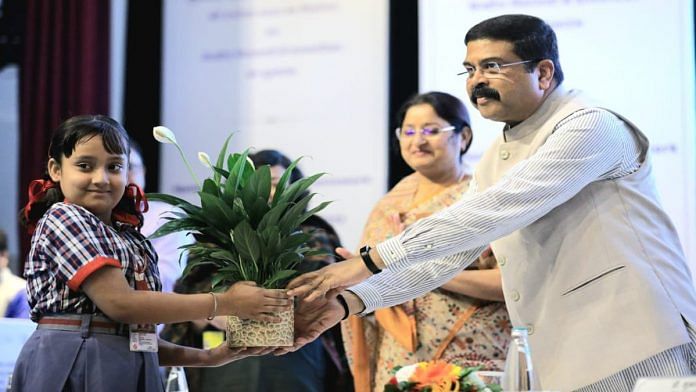New Delhi: From recommending that no textbooks be used to teach 3 to 6 year-olds, to incorporating board games and stories from Panchtantra (a collection of Indian fables and folktales) in lessons for children aged 6-8, the education ministry Thursday suggested a host of changes in the school curriculum for this age group.
The National Curriculum Framework (NCF) for Foundational Stage (3 to 8 year-olds) was released by Union Education Minister Dharmendra Pradhan. It has been developed by a committee of experts headed by K Kasturirangan, former chief of the Indian Space Research Organisation (ISRO), who was also the brain behind the new National Education Policy (NEP) released in 2020.
The 360-page document has received a mixed response from educationists, who think that “it is very scientifically designed, but challenging to implement”.
According to the document, “in the first three years of the foundational stage, for ages 3 to 6, there should not be any prescribed textbooks for children”. It further says that simple worksheets are more than sufficient for meeting the curricular goals of students in this age group.
It also emphasises that “special care should be taken to avoid promotion of stereotypes e.g., owls and snakes as evil, or dark-skinned people as scary, or the mother always handling the kitchen”.
The document suggests ways in which an interactive curriculum can be developed for children at various levels using story-telling techniques and real-life experiences. “In the last two years of the [foundational] stage — for ages 6 to 8, simple and attractive textbooks can be considered. Textbooks for this stage should not only contain content for classroom instruction but also act as workbooks to give opportunities for children to work on their own and also as a record of their work.”
It further says that concepts formed in the foundational stage are “largely perceptive and practical but not theoretical”, therefore, the content chosen “should be sensorially engaging”.
The content should activate a child’s senses and have an aesthetic appeal or be practically relevant in the context of the child’s experiences, the document says. It adds that the content should also be derived from children’s life experiences and reflect the cultural, geographical, and social context in which they are developing and growing.
For example, it suggests teaching them stories from Panchtantra, and learning math by playing the dice, among other things.
Also Read: From counting 1-10 to telling time, what Modi govt says your kids should learn from age 5 to 9
Experts worry about implementation
Ameeta Mulla Wattal, chairperson & executive director of education (innovations and training) at DLF Foundation Schools, told ThePrint that the document is “very scientifically designed” and “has incorporated elements of what is important for foundational years”, but “implementing it will be a challenge”.
“Teachers need to be trained properly before the document is implemented properly. We will need to train the teachers for at least 3-5 years before we start seeing changes,” she added.
Wattal further said that things like not using a textbook and teaching only with the help of workbooks and pamphlets is something that teachers in Indian schools have not done before, and they need to be trained for that.
Garima Ahuja, a Class 1 teacher at a government school in Haryana, said that a lot of what’s mentioned in the document is already being implemented in the school where she teaches.
“We are already teaching students through story-telling and toy-based methods but we also use textbooks for children. To give that up completely will be a little difficult,” she told ThePrint.
Another government school teacher, not wanting to be named, said, “The scale of implementation is so large that we will need to devote a lot of time. We cannot expect things to change overnight…teaching, learning has been happening in a certain manner for a long time.”
How the content will be developed
Content should be tied to individual characteristics of children, the document says.
Activities like cooking, travelling, and folk songs, stories, festivals, and rituals of a particular community or group are also worth teaching and should be part of the curriculum, the document says.
“Since the goal of cognitive development is to know about the world around and adapt to one’s environment; the content should reflect topics and themes which will acquaint children with the natural and human environment in which they are growing and developing, the social and the physical world, people, places, living and non-living things,” it adds.
(Edited by Anumeha Saxena)
Also Read: Training students for hackathons, revamped infra — all about new ‘PM-SHRI’ scheme for schools



